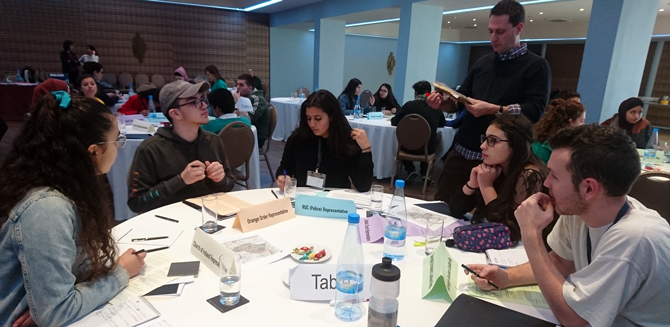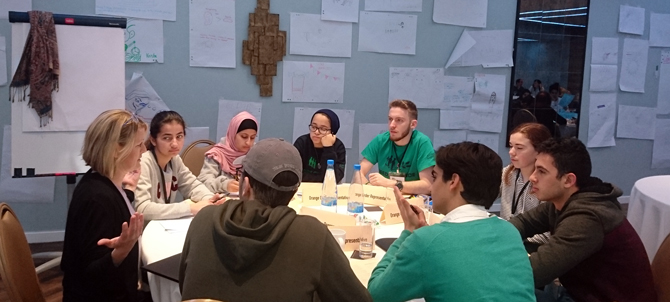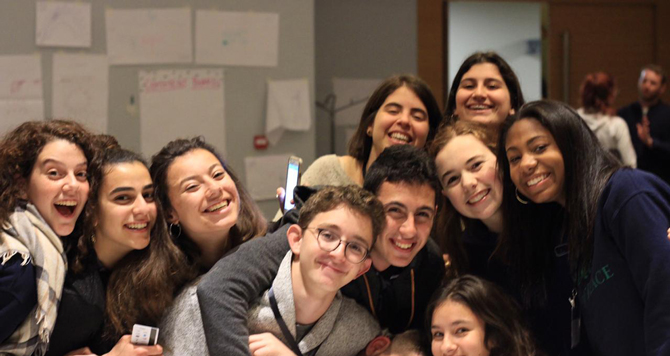It doesn’t take a high-level government position or even a law degree to practice good negotiation and mediation.
In fact, as a group of Seeds recently learned, many of us have been trying our hand at it for a very long time.
In January, 41 junior Seeds from Egypt, Israel, Jordan, Palestine, the U.S., and the U.K. met in Cyprus for a four-day seminar exploring how this vital form of communication can be honed to more effectively navigate difficult situations and decisions that arise in everyday life. Titled “Bridging the Gap: How to Resolve Disputes Through Negotiation,” the seminar was presented by a Harvard Law School team led by Bob Bordone, who has been facilitating such workshops for Seeds of Peace for eight years and recently joined the Seeds of Peace Board.
The first full day was essentially a crash course in negotiation, which, as Bob explained, is communicating to influence the choice of others. This is universal to being human from a very young age, and many Seeds were surprised to learn that they had already negotiated throughout their lives—whether to persuade their parent to buy them candy at the grocery store, or to convince a friend to go out to one restaurant over another. When you think about it, negotiation is all around us.

He also explained that negotiation is often thought of as a zero-sum game: if you are negotiating to get something, it automatically means that others are losing something. This is a fallacy, Bob explained, as negotiations, when done effectively, can be mutually beneficial for all parties involved.
The Seeds were able to explore these concepts through a role-play of a negotiation involving the comeback of a retired soccer player. Using pre-written assigned roles, pairs of Seeds—one representing the player’s agent, and the other the team manager—went through the process of trying to understand one another’s interests while seeing if their own needs and interests could ultimately be met.

To prepare for the conversations, Seeds learned about the process of determining BATNAs (Best Alternative To a Negotiated Agreement). The best negotiators go into the interaction having already considered alternatives so if for some reason, the negotiation reaches an impasse, they are able to offer another proposal for a different outcome.
The exercise was a case-in-point of how good planning is critical to negotiating, and that the best negotiations are the most predictable ones, because it allows the parties involved to anticipate the various directions it could go. At the end, many of the Seeds were pleasantly surprised that they could negotiate an agreement that was beneficial to both the soccer player and the soccer team.
On Day Two, the seminar focused on the practice of mediation. Mediation, though similar in many ways to the facilitation that happens in dialogue at Camp, specifically looks for a resolution or plan for settling a disagreement or dispute. Though two parties in conflict may not be able to reach that agreement, it sets out to help them try.
Dialogue facilitation, as Seeds know, is more focused on the process that fosters a deeper understanding of self and others, with no tangible deliverable to achieve. Like with dialogue, mediators between two parties must focus on projecting neutrality, set a series of ground rules (such as no interrupting), and should never suggest solutions—only guide the parties to produce their own ideas for solving the conflict by using open-ended questions and pushing for specificity.
On the final day of the seminar, the Seeds participated in something called a multi-party negotiation, during which they played the roles of many different stakeholders involved in the Northern Ireland conflict. Not only did they get to learn about the details of the long history of the conflict, but they got to step into the shoes of various affected parties to see how it would feel to try and negotiate with and mediate one another.
By the end of the experience, the group of 41 had formed into its own new community, hugging and struggling to leave one another, just like on the last day of Camp.

This spring, Seeds of Peace plans to continue to work with Bob’s team from Harvard Law School to offer these seminars, including a session in New York City in April. Learn more about our programs for young leaders ››

